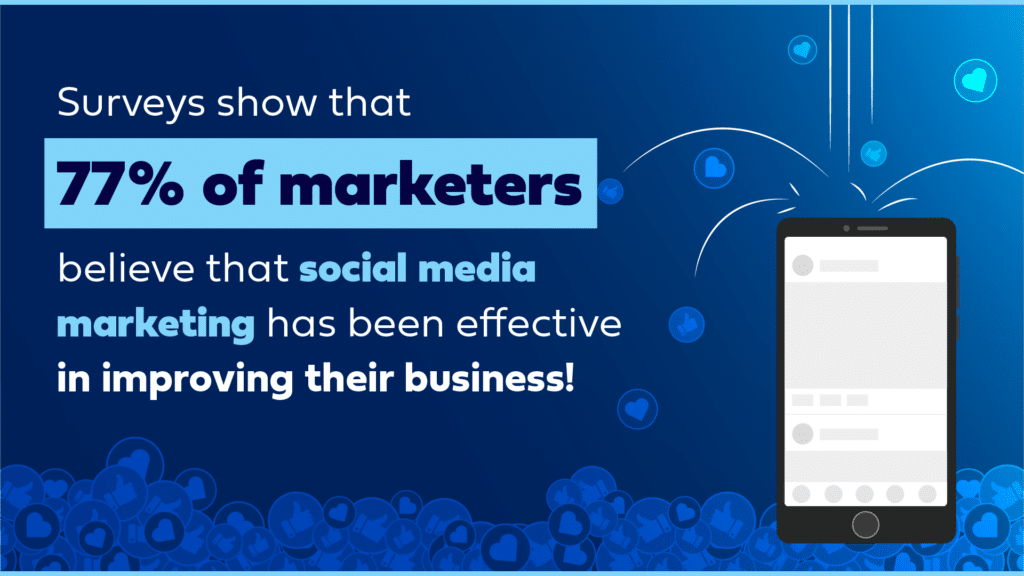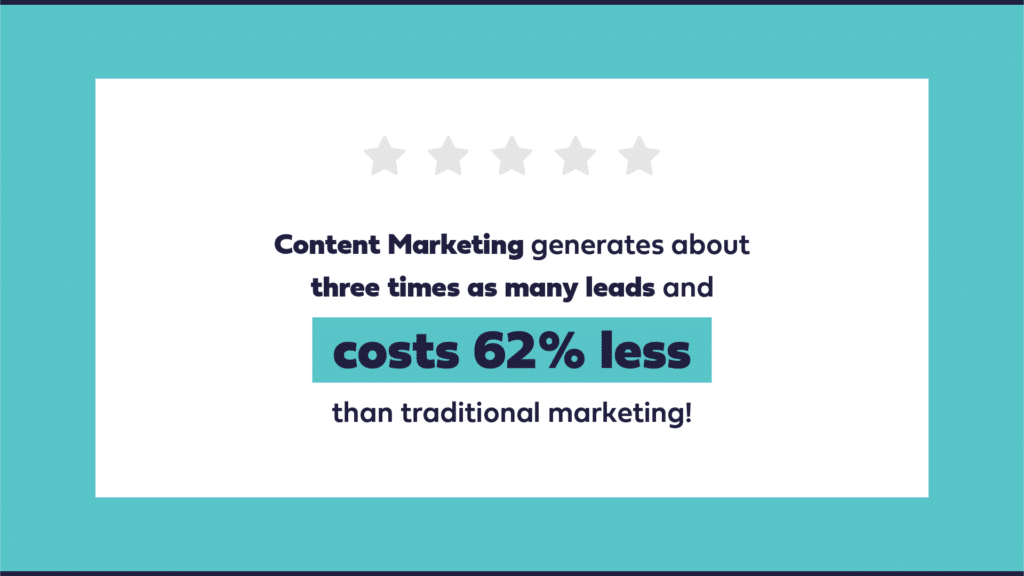Legal Marketing for Lawyers and Law firms Nationwide
Marketing your law firm is a must. Gone are the days when marketing is merely a nice-to-have addition to your business plan. Competition in the legal field is increasingly hungry for a bigger share of the pie. It is paramount for your firm to have a marketing strategy in place that will position it in such a way that will keep your phones ringing. Here are some benefits you can look forward to with a functioning marketing plan:
- Enhance your firm’s first impression.
- Drive awareness.
- Build on your firm’s credibility.
- Strengthen trust.
- Provide value for your firm and your prospects.
- Position your firm as an industry leader in your local market.
- And last but definitely not least, ongoing business.
Using and combining all the different marketing channels can give your law firm a great advantage. Your firm will have a presence in multiple areas, however, it is not a one-time-fix deal. Marketing (especially digital marketing) is dynamic and requires constant updates. That is if you want to meet your prospects where they currently are before your competition gets to them!
What is a Law firm Marketing strategy?
A marketing strategy gives your firm direction when navigating uncharted waters. It is a business’s overall game plan for reaching prospects and turning them into customers.
Some questions the marketing strategy should answer are:
- What services does your firm offer?
- Who are you delivering to?
- How will you deliver your services?
- Who are your competitors?
A marketing strategy is essential to get the biggest bang for your buck and get new businesses to start rolling in. We’d like to highlight here, for semantics sake, that there are a couple of terms that frequently get used interchangeably, but aren’t quite the same. These terms are marketing strategy and marketing plan. A marketing strategy focuses on long-term marketing plans, which in turn each have specific details and types of marketing activities.
In order for your overarching marketing strategy to succeed, the individual marketing plans it comprises must all be well-thought-out and interconnect smoothly. We recognize that for your firm to stand out in today’s competitive environment, it needs to build and actively maintain connections with prospects and clients alike. We can help you achieve that.
Talk with our sales consultant Sam Polesak!
SEO
SEO for lawyers is critical for your firm’s long-term marketing strategy. It is the process of improving the organic traffic that reaches your website and its individual web pages from search engines.
SEO has several benefits to offer your firm, including:
- Bringing traffic to your website.
- Building your brand.
- Strengthening your PR.
- Boosting your rankings.
- Helping you reach more people.
- Converting users to calls and cases.
SEO services are a must-have in today’s world. 85% of users do some form of online research before deciding to buy a service. With so many available options, people rely on the internet to determine where to invest their dollars.
Local SEO
Local search engine optimization, local SEO, is a branch of SEO that focuses on boosting your website exposure in the local search results pages. It allows you to rank locally, which means you can laser-target quality leads in your vicinity. This makes it crucial for law firms to jump on the local bandwagon, as the leads you need are all typically found in your area, whether you consider that to be your general neighborhood or state.
Local search helps your business be featured on Google’s local results – you know, the map on the first SERP. Not to be confused with local service ads, with local search ads, your exact location is shown on Google Maps and directions are provided to reach you, as well as your open times, options to contact you, your website, etc., per listed on your firm’s Google Business Profile account.
Here is an example of what pops up when you search for Consultwebs:
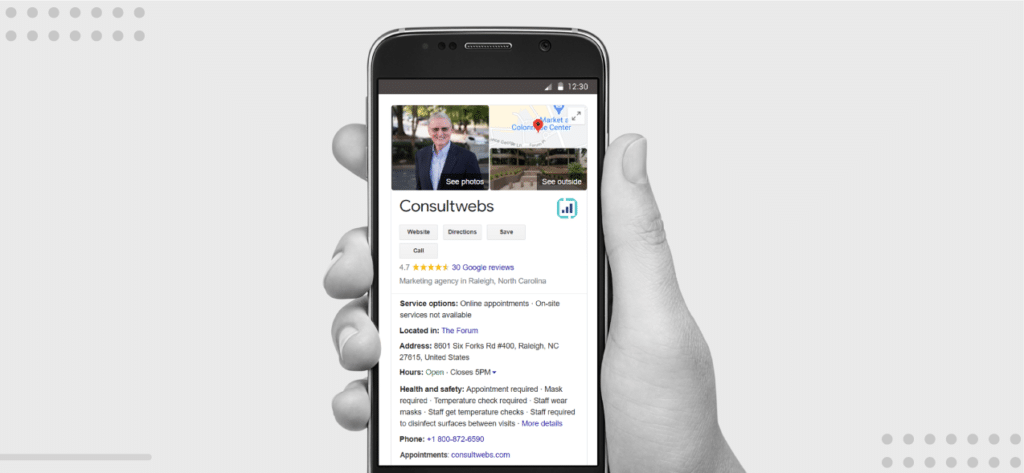
In order for your firm to be GMB verified and have local search ads running, you’ll need to claim your firm on the platform first. If you’re looking to expand your customer base and boost your paid efforts significantly, signing up for local search would be a smart strategic step to take.
Pay Per Click Advertising
Want to laser target clients and start seeing results quickly? PPC may be your most viable option. A pay-per-click strategy is one in which you can achieve increased, high-quality web traffic by launching ads and paying each time one is clicked on.
Some benefits of PPC include:
- Contributing to your firm’s business goals (i.e., attract 2x more clients).
- Measuring success with live ads and tracking tools like Google Analytics.
- Helping your SEO.
- Targeting leads at the last stages of the sales funnel.
- Customized ads that match your firm’s brand.
There are multiple PPC campaign types that you can choose from, and all have their own set of benefits and unique traits. One of the most efficient is Google Ads (and Bing Ads) campaigns, in which you are able to target the segments of your audience that make their searches on search engines. You may also want to explore your options on the Display Network on Google Ads, where banner images are served to the users you target on websites they visit that allow ads on their web pages. You may also want to look into social media ads, in which you reach people who are actively using the different social media platforms, such as Facebook, Twitter, and Instagram, among others.
We consider PPC campaigns to be a fundamental addition to your overall marketing strategy if you want to rise above your expectations. They can help you increase the number of calls coming your way, visits to your website, interactions online, etc. It is worth mentioning, however, that PPC is highly competitive and can be costly if the money spent on ads is mismanaged. Because of this, your firm can benefit greatly from a team that knows how to target your ideal personas and create the most attractive ads possible while making sure your ROI is kept high. If you are curious to know how PPC can get you more leads, talk to our professionals.
Google Ads
Google Ads is an online advertising platform that was created and is run by Google. Placing ads in both search engine results, such as through Google Search ads, as well as non-search sites, apps, and videos through Youtube, your targeting options are incredibly varied. Not only are your ad creation and targeting possibilities bountiful, but the analytical tools you have at your disposal with Google’s suite of advertising and monitoring programs can also give you in-depth insights as to what your prospects do after they’ve clicked onto your site. By following their digital footprint on the web, you have additional options to target them, such as a retargeting campaign. Things you can track are, for example: whether a prospect booked a call, whether they downloaded any content, or maybe whether they’ve subscribed to your newsletter.
Social Ads
Due to the variety of social media options, don’t be afraid to get creative with the PPC ads for these channels. Social PPC has plenty of advertising options, and the price varies according to the keyword competition and the channel. For example, when speaking of a specific platform like Facebook, the United States is the second leading country by users. Facebook has the highest ad placement preference because the CTR, click-through rate, is higher than on, for instance, Instagram.
It’s a no-brainer to want to include social ads in your big picture strategy; in the end, it is paramount to be where your prospects are if you want a share of the pie. Depending on the types of clients your firm has historically dealt with, you can have a clearer idea as to what platforms might be the most effective ones to target in order to reach an audience similar to it. We can help you figure out what networks might be your best bet. Make sure your Social Ads money is well spent. Our team of experts can help you manage your spendings and keep the focus on ROI.
Display Advertising
Display ads are like social ads, but they branch out to social media ads and website ads. They drive awareness and persuade people to take action. They are helpful with retargeting campaigns. Retargeting campaigns are a long-term marketing strategy and use paid ads to target prospects that have already visited your website. Why is retargeting important?
Retargeting campaigns increase the probability of converting an interested prospect into a client. In this day and age, clients need a lot of convincing before they decide to purchase. Around 97% (almost everyone) who visits your website for the first time leave without buying anything. For this reason, retargeting with display advertising can be that one factor that persuades prospects into sticking with your firm.
Local Service Ads
LSA, local service ads, originally started as an ad type that was exclusive to home services, such as plumbing, electrician or garden services, etc. The list of industries that can use LSAs is still limited, but it is growing and we are thrilled to confirm that the legal industry is on that list! Since being added as an eligible industry, many firms have come to know this ad type as one of the most appealing and efficient ones in their arsenal of marketing tactics.
Not to be confused with local search ads, local service ads are pre-vetted and pre-verified by Google and offer a direct “click-to-call” functionality and boast elements that are valuable in the decision-making process for prospects: reviews and the Google Guarantee badge, which protects clients who do end up signing with you through LSAs. As an additional plus point for your firm, you only pay for viable leads, unlike in PPC campaigns, where you pay for each click.
Here’s a visual representation of what attorney LSAs look like on the first SERP on Google:
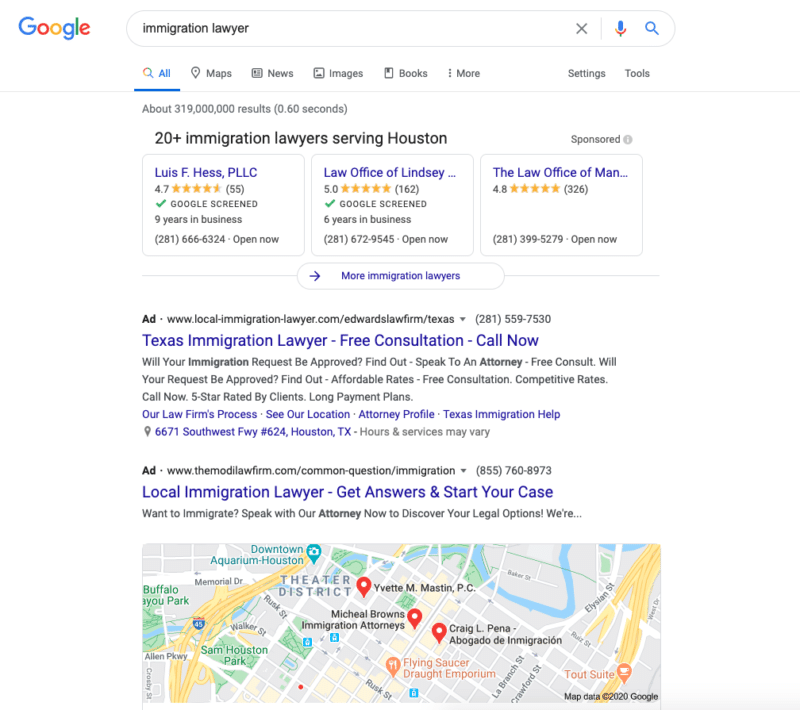
LSAs are an excellent tool for law firms of all sizes because it levels the playing field. The main purpose is to give everyone in any given industry a fair shot at being found and selected by prospects. This means that small law firms compete with more prominent law firms in the same area. This is why making sure your review-acquisition game is strong; a big aspect prospects look at when choosing the firm they will sign with is the number of positive reviews a firm has, and how it has responded to negative ones. The two types of reviews that are presented on local service ads are GMB reviews and verified reviews. The GMB reviews automatically link to your firm’s LSA account, and verified reviews are the new reviews left by the clients that contacted your firm through LSAs.
Web Design
Your website is your firm’s first impression online, and your first impression may matter more than you think – people online “eat with their eyes,” after all! External factors like designs, packaging, colors, and easy-to-read content influence people, as does your site’s overall functionality. Apart from having a working, aesthetically pleasing site, your firm needs to convey the message that it is your prospects’ best option by standing out for the right reasons, while also remaining aligned with its vision and mission. Your website can help you achieve that. It is a reflection of your firm’s business model, and it should translate as such.
Your website can increase your local business, highlight your personality/USPs, motivate action, and most importantly, it can help you retain and acquire more customers. It is one of the best investments your firm can make. But, a website isn’t a one-time and done deal. As mentioned, successful websites are built with the purpose of not only being easy on the eyes but, more so, being responsive. This requires continuous optimizations and updates to the site, and this holds especially true when considering the many Google updates that pop up throughout the year. The more in line with the announced best practices your website is, the higher your chances of seeing ROI through it – and this entails keeping up-to-date and making the necessary adjustments to it.
When working with us, you can rest assured that your firm is making a solid and bold statement with its website. Our team creates custom websites to fit the model that best works for your firm.
You can expect the following when building a customized website with us:
- Optimized website to enhance the user experience.
- Showcasing of your USPs.
- Representation of visuals that match the uniqueness and personality of your firm.
- Design of logos, visuals, content creation, and all aspects to meet your marketing strategy and marketing plans.
- Commitment to your firm’s long and short-term success.
Email Marketing
Ever heard that email is dead? If you didn’t scoff at that thought then, you can now. Think about it: What is one of the first things most people check in the morning? Their emails.
Email marketing lets you speak directly to your clients by reaching them through their inboxes. It also relies heavily on personalization, one of the most powerful best practices in marketing. 71% of consumers have stated that personalization influences their desires (or lack thereof) to open and read emails, and the percentage continues to grow with the upcoming generations of millennials and Gen-Z. You can get some idea of where to start with personalization by touching on their pains and desires. Analyze what you’re promising your subscribers when they first sign up for your newsletter and make sure you always deliver on that.
By making sure the personalization of your email is well taken care of, you can expect email marketing to help your firm by:
- Improving your sales.
- Producing cost-effective campaigns.
- Providing valuable content.
- Sending out targeted messaging.
If the individual elements of the email are not all lined up correctly, however, the messages you take so much time and dedication to craft, might just end up in the spam folder. Bummer.
In order to increase the likelihood of your emails being opened and read, you’ll need to make sure they contain the right messaging, subject line, design, and call-to-actions for your audience. It can be confusing to figure out what is wrong and what is right, but the good news is that the perfect email marketing strategy is at your firm’s reach! Our team of experts knows the email marketing game, and they are ready to help!
Talk to the experts if you are curious about reaching and speaking directly to your clients and prospects.
Social Media
Most people today are active on at least one social media platform, and they typically spend a great deal of time there, whether to find out more information, stay up to date or in touch with friends and family, entertainment, etc. Meeting prospects where they are has been ingrained in marketers’ modus operandi for centuries, but today it means meeting them online and on the social media platforms they frequent the most. Depending on your specific audience and its demographics, your best bets may be Facebook, YouTube, Twitter, etc., or possibly a combination!
Social media is often seen as an extra addition for law firms. But in reality, by building a connection through them with your audience, you can drive more business to your door. Social media is vital for law firms for a number of reasons, including:
- Supporting the general public with information during times of crisis.
- Developing your firm’s image and awareness.
- Nurturing relationships.
- Connecting with clients (and prospects you might have otherwise missed!)
- Establish yourself as an industry leader.
To ensure this, some of the best social media practices your firm should follow are:
- Securing your social media profiles (with your name, logo, general information.)
- Reviewing paid ad options.
- Customizing the content.
- Connecting with the users.
Custom Content
Ultimately, what does it take to stand out? Custom content. Content that focuses on providing a genuine connection with prospects and clients alike by offering them valuable information, packaged in an easy-to-understand format. The more relevant it is to readers, the more conversion-focused it becomes!
Custom content helps build authority online while adding quality and fresh content to your site, making it increasingly trustworthy and valuable in search engines’ eyes as well. The more you post and the more relevant it is to, for example, Google, the higher up your site will rank on the SERP.
There are many factors Google’s algorithm takes into account. Some of them include:
- in-depth quality content
- keywords
- content-length
- updated content
- originality
- link building
With custom content, there is no set list of rules to follow besides trying to match the wants and needs of your clients to Google’s rankings. Our FREE content guidelines with tips and tricks on how to maximize your content-optimizing efforts can help you kickstart your content strategy plan. It contains ideas on custom content pieces you can consider creating, including:
- Blog post section
- Social media
- Infographics
- Testimonials / Case studies
- Practice area pages
We understand the first step is always the hardest. Because of this, we have decided to give you a roadmap to follow. As a start, you can download a lawyer’s guideline to writing online content that converts.
Video Advertising
Video advertising can be your firm’s secret weapon. Not only are they successful, but they allow your firm to creatively express whatever message it wants to get out there! What makes them successful is the fact that humans tend to be primarily visual beings. In today’s world of information overload, people filter information in and out very quickly. It’s relatively easy for consumers to click something off and keep scrolling.
Yet, the beauty of videos lies in the fact that it is easier to process and captivate the user’s attention with images, infographics, storylines, etc. Prospects want to see information portrayed graphically, and because of this, more and more businesses are implementing this relatively new tactic. And if you deliver what prospects want, you will surely see an increased ROI, boosted traffic and overall profitability!
Reputation Management
We’ve said it before, and we’ll say it again: What you say of your firm matters but what others say matters even more. With reputation management, you can shape the perception your key audience has of your firm and ensure you put its best face forward.
The digital realm is growing exponentially with each passing day, and with it the amount of online activity. Your firm’s office space has inadvertently expanded out into the digital world, and it is paramount that your good reputation is maintained on both fronts.
This is not to say, however, that if you have negative reviews or there are unflattering comments floating about regarding your firm, then all is lost. On the contrary! Negative reviews are normal and can even be leveraged to your advantage! It just takes some creative strategizing, customizable response templates and a thought-out plan of action to achieve.
In addition to dealing with existing negative reviews, seeking out more positive reviews is the other half of a strong reputation management strategy. Collecting positive reviews from happy clients requires a strategy of its own, as many might have concerns about their privacy or don’t know how to start writing about their great experience with your firm. Depending on the client and their personality, you might want to ask them directly after successfully closing a case or perhaps wait it out for a few days before following up and requesting a review then. Some clients might benefit from having a few review templates forwarded to them for them to modify according to their thoughts, and some might just jump right in. Take this portion of your reputation management strategy step by step, as it all runs on a case-by-case basis and it can vary substantially from one client to the next.
It’s clear to see how positive reviews highlight the quality of your firm. They boost your firm’s credibility, sales and serve as a form of social proof. Learn how you can take control of your firm’s online reputation today.
Technology & Support
No matter what combination of marketing efforts you want to tackle, you need to make sure that your site is kept both safe and functional with the help of IT experts. Without proper security, investing in a beautiful web design and an entire marketing strategy is very risky. One of the dangers this implies is potentially falling victim to cyber attacks. This is when cyber criminals gain access to your computer and/or network through your unprotected site and can steal both your and your clients’ personal information. A cyber attack on your firm can damage your reputation and overall trust with customers, especially considering the sensitive information law firms handle.
Clients trust your firm with their most private information and trust they are in safe hands with you. To guarantee this is the case, it’s of the utmost importance your firm’s website is secure and under watch at all times.
At Consultwebs, we have a dedicated team of IT experts available by phone, email, and your website who make sure your website undergoes round-the-clock supervision and regular maintenance. Some benefits you can expect from our technology and support include:
- WordPress with plug-ins and tailored functionality.
- Pagely, award-winning hosting provider used by some of the best-known companies in the world.
- Website security.
- Compatibility with all the devices, i.e., PC, Mac, Etc.
- Top-grade technology
If you’re thinking, “is this really necessary?” It is. Cyber attackers do not wait. Cyberattacks can happen at any moment, and they can target individuals and businesses alike. For the sake of your firm’s reputation, secure your firm and your clients with technology experts.
Traditional Media
Traditional media is any media channel that was available before the digital boom. It includes print, radio, television, billboards, and cable. If you’re asking yourself, “should my law firm exclude traditional marketing?” the answer will depend on your wants and needs. In spite of what the majority think, traditional and digital media do not necessarily have to go head to head.
While there are many advocates of going full-on digital, the reality is that there are advantages and disadvantages to traditional media that need to be considered. The main complaints marketers typically express when talking about traditional options is that the audiences are difficult to target efficiently, there is no real way of measuring results, and the ads to make it out are often overseen because of what’s known as advertising clutter – when magazines are primarily ads, most are ignored!
There are also advantages to traditional advertising that you will want to consider when building your marketing strategy:
- Law firms can use billboards to gain awareness in a specific area.
- Use print advertising to reach prospects that enjoy magazines, and target specific magazines you know your clientele purchases.
- Radio advertising delivers the message immediately. Plus, the frequency and repetition are higher because the radio repeats ads throughout the day.
- One of our favorites is sending personalized direct mail. The more personalized you can make it, the more spoken to the recipient will feel, and the more appreciated it will be.
Tools and services to help with law firm marketing
Digital marketing and monitoring tools go hand in hand. But what about CRMs and tools that help with specific marketing channels? How do they work, and in what ways would your firm benefit from signing up for them? And more importantly, which ones do you need to help boost your marketing efforts? You might find they don’t all apply to your specific needs, and that’s ok. We’ve compiled a list of tools here for you to review.
One thing you should be aware of, however, is that these marketing tools are an investment of their own, and mastering them will require time and dedication.
Get your money’s worth without the time investment. You have the chance to work with a team of experts in legal digital marketing that is hyper-focused on your success. Get in touch with us now to see what Consultwebs has to offer your firm.
With all that said, the following are some of the digital marketing tools and services your firm might find helpful:
CRM Tools
With a CRM (customer relationship management), you can manage the interactions with clients and prospects. A CRM pulls all your law firm’s information from emails, social media platforms, websites, calls, and additional channels. You can organize your workflow and keep a clear record of clients. It stores information such as contact details, records issues, manages the overall marketing campaigns, metrics, the customer experience, and much more.
A CRM can give you peace of mind and more benefits, including an optimized customer experience, increasing sales, higher efficiency, and overall transparency for your employees and your clients.
There are many CRM tools and integrations to manage for your firm. As an example, Active Campaign helps small, medium, and large enterprises keep a clear overview of their contact base, manage and automate the different sales processes they may have and it also has integrated email marketing automation tools. Other popular CRM options include HubSpot, Salesforce, and Oracle.
Website Tools
Work smarter, not harder with website design tools. Become even more efficient with the right website management tool you choose to work with, based on your wants and needs!
The digital realm is one that seemingly never ends, and your website is just one of the vast sections that it comprises. Having a basic understanding of the website tools you can implement can help make your site stand out from the rest by making the design and optimization process easier (and the more fluidly things flow internally, the better things tend to look on the outside, too!). To help you get started, here are 3 basic Google tools you can start implementing:
- Google Search Console: A free service that can help you measure how your website is doing in terms of organic traffic and it helps you identify which search terms are the best ones for you to target as keywords to ultimately get you as much relevant traffic as possible. Additionally, it helps you check and fix issues on your web pages.
- Google Keyword Planner: Helps you refine your keyword research and optimization by providing keyword bid estimates and keyword competence.
- Google PageSpeed Insights: Checks the performance and speed of your website or a specific web page.
Whether you want to start your website from scratch or work with what you’ve got, we can follow your vision with a design that works best for your firm. Throughout the years, we have been able to create beautiful user-friendly websites with the help of digital marketing tools such as the ones previously mentioned. Feel free to check out the portfolio of websites we’ve built for law firms like yours.
Google Analytics
Google Analytics helps you see how you’re doing online. It is one of the most used digital analytics tools. It is a “freemium” tool because it is free for small businesses, but you’ll need to pay a fee to unlock advanced features.
Once you have your website, you have to paste the Google Analytics code on your website for it to automatically start collecting data. It can help you get an in-depth analysis of your website’s visitors. Overall, it can help “take your website’s pulse” by providing valuable insights into your campaigns, posts, and interactions with the users.
There are many features you can track; the basic ones would be the analytics ABCs:
- Acquisition: Where the website visitors are coming from, i.e., Google, referral, or social media.
- Behavior: When a person enters your website, they begin their customer journey. The behavior report lets you see what the user is doing on your website. Some tracking includes average time on a page and/or bounce rate (those that left after looking at a single page).
- Conversions: Lets you see how people convert on your website. You can custom-track what works best for your firm, i.e., track calls or filled-out forms.
SEO Tools
SEO tools are essential because they help you target the keywords that users are probably searching for and they also help boost your rankings on search engines like Google.
Your firm needs to market what it offers for people to find and pick you on the first page. Users rarely go past the first results page, so your best bet it to have the best tools the digital shed has to offer under your belt. There are hundreds of options to choose from and weigh out against one another, a couple of our top picks are Buzzsumo or SEMRush. In addition, you can check out our complete 2024 SEO guide for law firms.
Email Marketing Tools
If email marketing is on your list of marketing tactics (and it really should be. Here’s why!), adding efficiency-boosting tools can be a real lifesaver. Automation tools save time, and we know how precious time is to you.
Email marketing automation tools like Mailchimp, can send trigger emails, schedule emails, and divide email lists by audience segmentation. The latter can help your team minimize customer drop-off and maximize quality leads looking to convert to calls and cases by ensuring the right message reaches the right people at the right time!
There are several types of campaigns you can run with an email marketing tool. What’s more important is that you’ll be able to capture many customers on the different sales funnel stages. For example, you could make an email campaign with informative content for users that have just discovered your firm, and a follow-up email campaign targeting another set of prospects that have already done certain actions (like downloaded a resource, booked a call, or have remained on certain pages of your site for more than 60 seconds, etc). By laser targeting your email series, you can keep all the different leads engaged. Another perk is that you’ll also be able to measure your success and get a report from this.
Social Media Management Tools
It can sometimes feel like there are too many social media channels to keep up with, and for law firms looking for new clients, this may come as a challenge. Some of your prospects might be on Instagram, while others are on Facebook, YouTube, or LinkedIn. Regardless of where they might be, social media plays a crucial role in helping connect and nourish relationships with clients. And it is critical for your firm to be able to reach your audience where they’re at.
Sound a bit overwhelming? Fret not, it is possible to manage all your social media platforms with one tool. There are many social media management programs, one example of which would be Hootsuite. It manages all your social media accounts, schedules posts, publishes them, and retrieves social media analytics from the platforms you connect. Alternatives worth mentioning are Sprout Social, Buffer, and Sendible.
Clients appreciate it when law firms want to be a part of the conversation and offer valuable pieces of content. Interacting on social media channels reinforces the top-of-mind awareness amongst the people you’re trying to connect with and what better way to take advantage of this than by engaging with real-life prospects and offering them content that is worth their time?
Law Firm Marketing KPIs to Measure Success
The first step towards success is identifying where you’re at, where you want to be, and how you want to get there. In marketing terms, you’ll need to look into your KPIs (key performance indicators) and discern what needs to be improved, and how. We have listed metrics you should consider when listing out what exactly it is that you want to start measuring and improving below:
Digital Marketing ROI: The amount of money you gain after considering your costs.
CLV, Customer lifetime value: The revenue your firm can expect from a single client. You can calculate the CLV using the following formula:
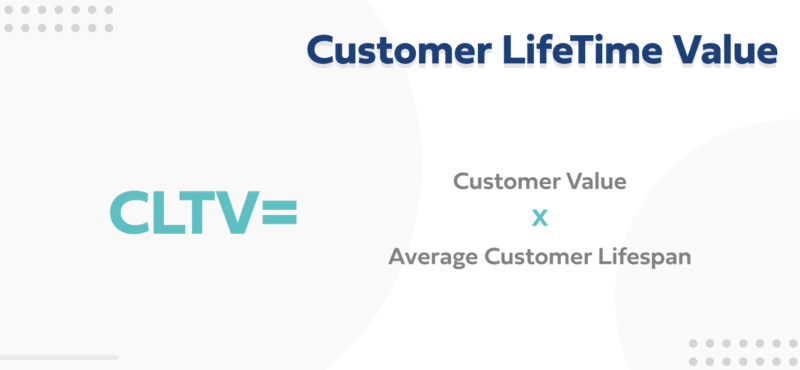
This will be quick maths. All you have to do is multiply the customer value and average customer lifespan. That’ll give you the CLV. The following are the two formulas:
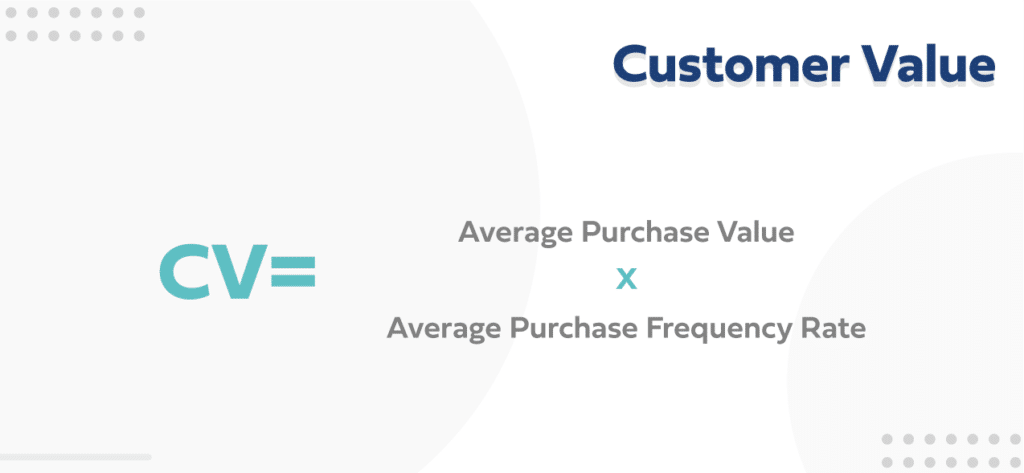
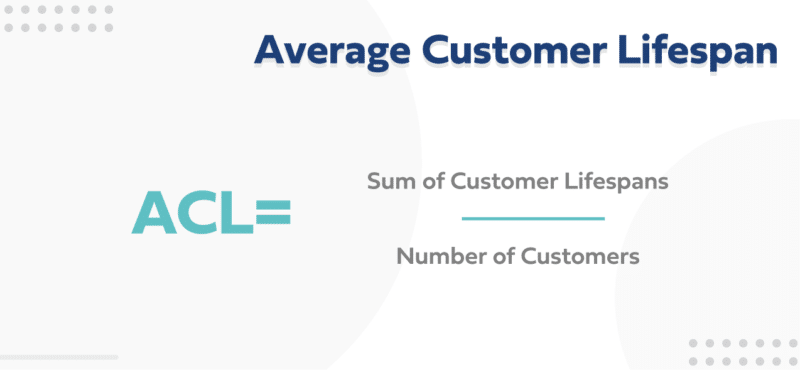
CAC, Customer acquisition cost: Is the cost of acquiring a new client. The CAC can be calculated by dividing all the marketing expenses by the number of customers acquired when the money was spent.
NPS, Net promoter score: Helps measure the customer experience and predicts your firm’s growth. The following formula calculates the net promoter score:
% of promoters – % of detractors = NPS (Net promoter score)
- Promoter – They score in the 9 – 10 range and are loyal.
- Passives – They score in the 7 – 8 range. They are satisfied but aren’t 100% loyal. They may compare and contrast.
- Detractors – They score in the 0-6 range. They are dissatisfied and can damage your brand.

Customer retention: This is the process of re-engaging with existing clients, so they continue to seek out your business. An advantage of customer retention is that it’s less expensive than trying to acquire a new customer.
Social Media Metrics: There’s a great deal of what you can measure here. For starters, the following are the three primary social media metrics:
- Likes and followers: total subscribers and followers.
- Engagement rate: engagement online means the number of likes, shares, retweets, comments, etc.
- Reach: % of people reached
SEO metrics: Like the social media metrics, there are also several SEO metrics. To begin, you can measure the following 3 SEO KPIs:
- Backlinks: the number of links between websites. The more votes you get, the more it positively affects your SEO’s ranking.
- Analytics: It’s possible to track the unique website visitors, organic traffic, bounce rate, page views, etc.
- Rankings: CTR (click-through rates) count as rankings. Keywords and search ranking also falls under SEO metrics.
Conversion rate: This is the percentage of visitors that completed a specific action. To enhance the conversion rate, you can include CTAs, call-to-actions like “Submit a form.”
Referral traffic: If you need to answer the question, “Where are most of my clients coming from? Then tracking referral traffic can help you form a concrete answer. This metric enables you to understand where the majority of your visitors are coming from.
MQLs, Marketing qualified leads: Are leads that are more interested than other leads but are not quite ready to commit to you. You can nurture an MQL and guide them to become SQLs. The qualified leads can be tracked with predictive analytics tools like IBM’s SPSS. These types of tools help identify existing trends to later predict possible SQLs for the future.
SQLs, Sales qualified leads: If an MQL goes past consideration and decides to commit, they become SQLs. To put it simply, they are ready to book a call with your firm. Likewise, SQLs are possible to track with predictive analytics tools.
To accurately measure MQLs and SQLs, you’ll need to keep the lines of communication open between your firm and, if applicable, the sales and marketing team. With the combined expertise of all groups together, you can discover new strategies to attract clients.
Conclusion
Marketing continues to grow as a critical stepping stone on the journey towards law firm success. Your prospects are on the lookout for trustworthy and knowledgeable legal representation. Your firm might be the absolute best in the business but prospects won’t know unless you show them. It is paramount for your firm to introduce itself to your prospects as their best option. It is important that you find what makes you stand out as a firm and highlight those characteristics in your marketing strategies.
Not sure where to start? Worry not! You can have your peace of mind while bringing in more calls and cases by teaming up with experts with the talents, tools, and technical expertise required to get your firm the results it deserves. If you are ready for your firm to crush its competition, let’s talk. See how you can surpass your goals with Consultwebs. A proven advantage towards your success.

